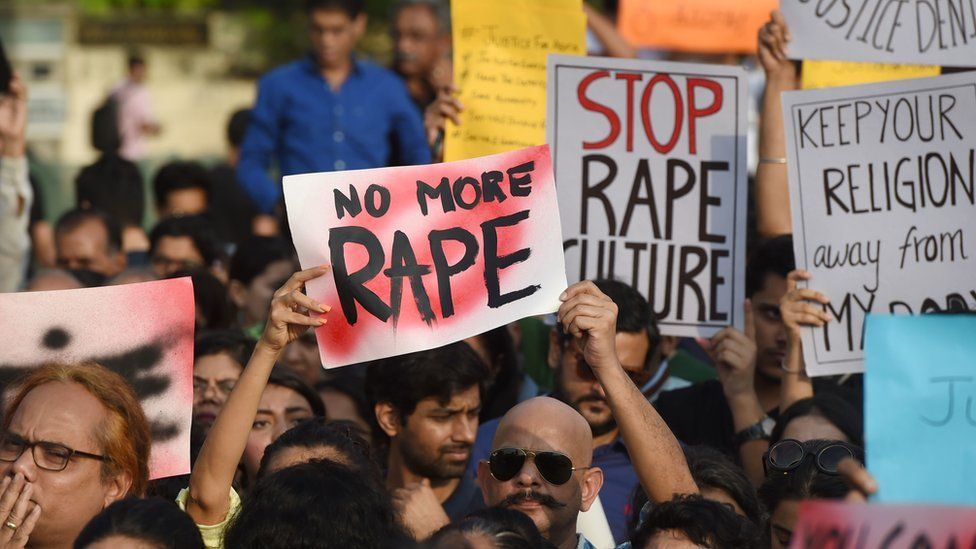How a child rape became a religious flashpoint for India
- Published

India's top court has moved the trial in the rape and murder of an eight-year-old Muslim girl out of the state of Jammu and Kashmir. The BBC's Yogita Limaye spoke to people in the community about the divisions that led to the court's decision.
"I just want justice for my child," her mother says. "I want her attackers to go through the same pain that she went through. The way they have made us cry, I want them to cry."
In India, a rape victim cannot be identified according to the law but everyone knows which religion the girl belonged to. Police allege that her religion is at the centre of the brutal crime.
She was from the Muslim Bakarwal nomadic tribe who roam the hills and valleys of Jammu and Kashmir. In the summer they graze their sheep, goats and horses high up in the mountains. As winter sets in, they descend to warmer areas near the city of Jammu.
This winter, in January, the girl was tortured, raped and killed. Police believe those accused held her captive for a week in a temple, where they repeatedly raped her before killing her.
Police say Hindus from Rasana village, about 70km (43 miles) from Jammu, wanted to send a warning to her community to move off their land.
In February, police arrested eight men, including a retired government official, four policemen and a juvenile in connection with the gang rape and murder of the girl. All of the accused are Hindus.
The case made headlines in India after right-wing groups and lawyers protested over the arrest of the eight Hindu men.
The religious identities of the victim and her alleged attackers have caused deep communal polarisation in the state, exposing the fault lines between Hindu-majority Jammu and the Muslim-majority Kashmir valley. The Kashmir valley has a tumultuous relationship with India - there has been an armed revolt in the region against Indian rule since 1989.
The family of the victim, meanwhile, have continued their annual journey into the mountains. In lush green meadows, they live in tents and cook on open fires.
"The Hindus didn't even let us bury her where we wanted to," her father says.
On the highway leading up to Rasana from Jammu, family members of the accused and people from the villages nearby are sitting in protest under a tree by the side of the road.
They are demanding a federal inquiry into the crime. They call themselves a Hindu Ekta Manch, or Hindu Unity Forum, which was constituted soon after the incident. In the Muslim-majority state, they say they do not trust local investigators.
"The Hindu community is definitely being targeted," says Kant Kumar, a member of the body. "We want an impartial investigation."
Madhubala's father and brother have both been arrested for the crime.
"I too want justice for the child but the real culprits should be caught," she says. She breaks down as she tells me, "Hindu unity is being attacked. Our voices are being suppressed. Am I not India's daughter too?"
In Jammu and the areas nearby, people do not know what to believe. The 15-page list of charges filed by the police describes the crime in horrifying detail.
"This is for the first time in Jammu that a girl is at the centre of communal violence," says Anuradha Bhasin, executive editor of the Kashmir Times.
"The most scary part is the use of the body of that little girl for scaring away an entire community," she adds. "That kind of narrative is very disturbing because it has long-term repercussions both for the safety of women and the safety of minorities."
But on social media and messaging services rumours abound. All kinds of theories have been floated about how the accused have been framed.
Placards and posters demanding justice for the girl are on display in many parts of the country - at traffic lights, on rear windows of cars and on social media.
Far from the noise, her mother wants the focus to be on what this is really about - an eight-year-old girl.
'She was so beautiful, smart and intelligent,' she says. 'I can't stop thinking about her.'
- Published7 May 2018
- Published14 April 2018
- Published17 April 2018